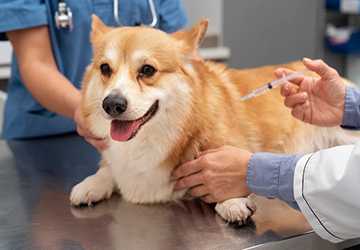pets
Are you afraid that someday your dog might face a random disease? How painful would it be to realize that a preventable disease was causing your furry mate to suffer? Terrifying, right? As a caring owner, we would go to every extent to ensure that our dogs stay healthy and fit. That’s where vaccinations come into play because they act as a protective barrier against the most unexpected illnesses. This article will discuss the five types of vaccinations you must know. These vaccinations will help you treat the disease before it deteriorates.

Why Vaccinate? The Key to a Healthy, Happy Pet
Imagine this: your happy and healthy dog suddenly becomes sick with a terminal illness. This is a scenario that no pet owner should ever face. Vaccination can prevent most diseases. Some viruses can even be passed on to people, so getting your pet vaccinated is a great way to ensure their health and contribute to the well-being of the pet community! Let’s get into the five most crucial vaccines to ensure that they maintain proper health and robust protection from potential infections.
5 Essential Vaccinations for Dogs
Let’s talk about practical solutions now. We’ll now tell you about five mandatory vaccinations that you should know to keep them healthy and away from any deadly illness.
1. Rabies Vaccination
This is a mandatory medicine that you must have at home. The viral infection of the nervous system is 100% fatal once symptoms show and can be transmitted to humans, posing a severe threat to public health.
Here is what to consider regarding a rabies vaccine:
● It is mandated by law due to the harshness of the disease.
● It prevents your pup from getting rabies exposure if an infected animal bites him.
● A puppy should be offered his first injection from 12-16 weeks of age and receive a booster vaccination yearly.
After that, your dog may be exposed to the virus every 1-3 years, relying on local rules and your veterinarian’s recommendation.
2. Distemper Vaccination
This is a deadly and highly infectious viral condition that can damage the respiratory, gastrointestinal, and nervous systems. In many cases, this is lethal, especially in puppies, but the vaccine is highly successful in preventing this cruel disease.
It is vital to remember the following facts about this vaccine:
It is regarded as a core vaccine for all dogs.
A part of a combination vaccination that protects against other diseases.
Many puppies require a series of dosages of this disease.
It usually starts at about the 6th to 8th week of age, with concurrence every 3-4 weeks until the puppies are about 16 weeks old. Depending on your vet's recommendation, adult dogs also need a booster shot every 1-3 years,
3. Parvovirus Vaccination
This viral disease is contagious and regularly fatal for dogs, especially puppies.
The virus infects the gastrointestinal system, leading to severe vomiting and diarrhoea, which can quickly result in fatal dehydration.
Do not leave your dog unprotected against this dangerous disease. Keep in mind the following information:
● This vaccine is a core one; all dogs need it, especially puppies.
● Usually, the injection is combined with distemper and other necessary drugs.
● Puppies must visit a vet several times, from 6-8 weeks of age to 16 weeks every 3-4 weeks.
● Depending on the vet, adult dogs require boosters every 1-3 years.

4. Hepatitis (Adenovirus) Vaccination
This is a life-threatening illness that assaults a dog’s liver, kidneys, spleen, lungs, and eyes. This can be a severe illness that rapidly leads to death if not treated properly. Vaccination is the most effective method to avoid this lethal disease. Here are some facts regarding the vaccine:
● The vaccination should be administered to all canines.
● It is distributed within a shot that contains distemper, parvovirus, and other critical vaccinations.
● Puppies require a dosage beginning at six to eight weeks of age and every three to four weeks following that until they are sixteen weeks old.
● An adult dog should get a shot every twelve months or bi-annually based on the veterinarian’s recommendation.
5. Leptospirosis Vaccination
This is a type of bacterial infection that can be transmitted to dogs and humans. The most common route is through the urine of affected animals, and dogs can develop severe kidney and liver problems. The vaccination is crucial for canines likely to encounter wild animals or come into direct contact with water tainted by animal urine.
Here is a brief overview of this vaccination:
● It is a non-core vaccination, but it is highly advised for canines in high-risk zones or those who spend time outdoors.
● The vaccination is generally provided individually rather than combined with other can shots.
● Most puppies acquire initial injections that are administered 2-4 weeks after the original injection in puppyhood.
● Adult dogs in high-risk or risky exposure zones typically receive yearly booster shocks.
Keeping Your Dog's Vaccinations Up to Date
Now that you know the necessary vaccinations for your furry friend, it's time to act! It is always better to be safe than sorry. The truth is you cannot know for sure when it might be too late. The veterinarian will help you establish a vaccination schedule for your pet, so keep in touch with the specialist. Remember that regular vaccinations are part of being a responsible dog owner. Keep your pet safe, and do not ignore your duty to make the canine community healthier. Please make an appointment with your veterinarian today, get the vaccination, and keep a record of it! This way, you will always be prepared for a regular check-up or an unpredictable emergency. Your dog is counting on you to be with them through thick and thin, so do not disappoint them!
03/27/2024





